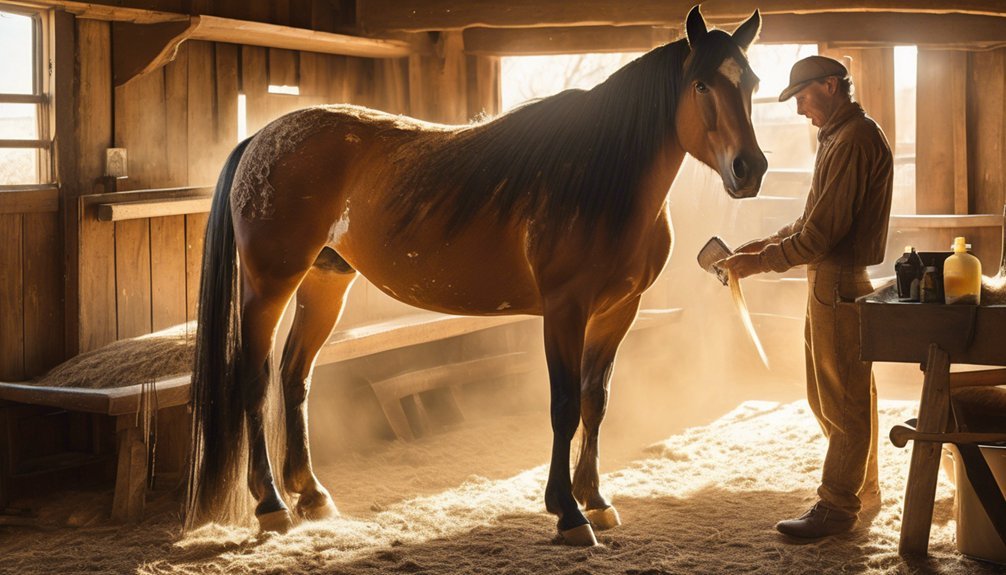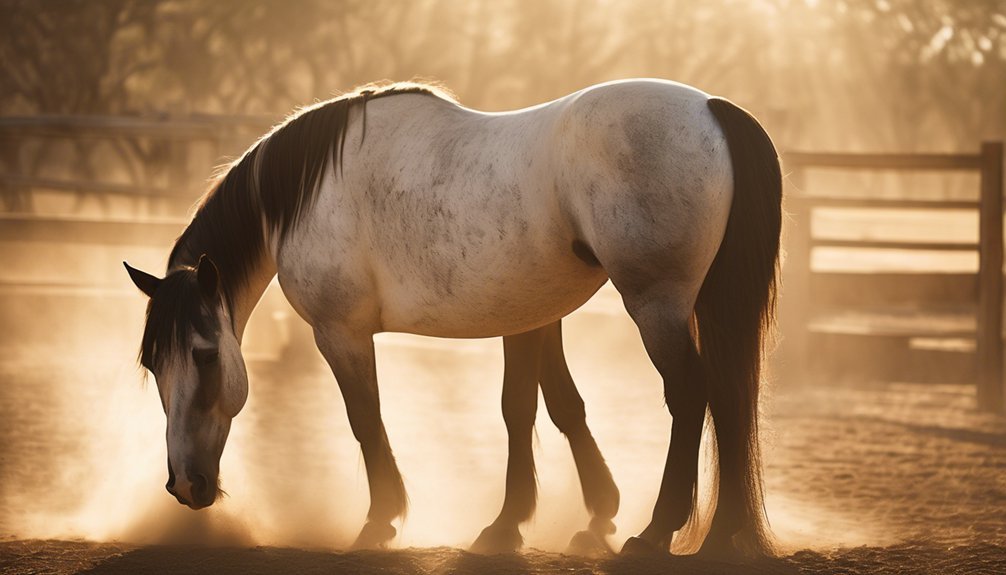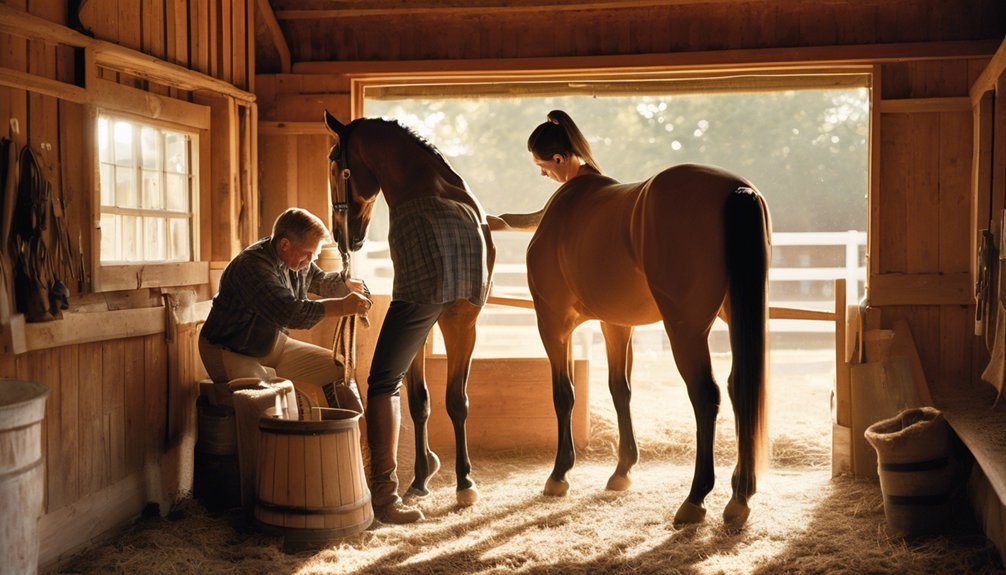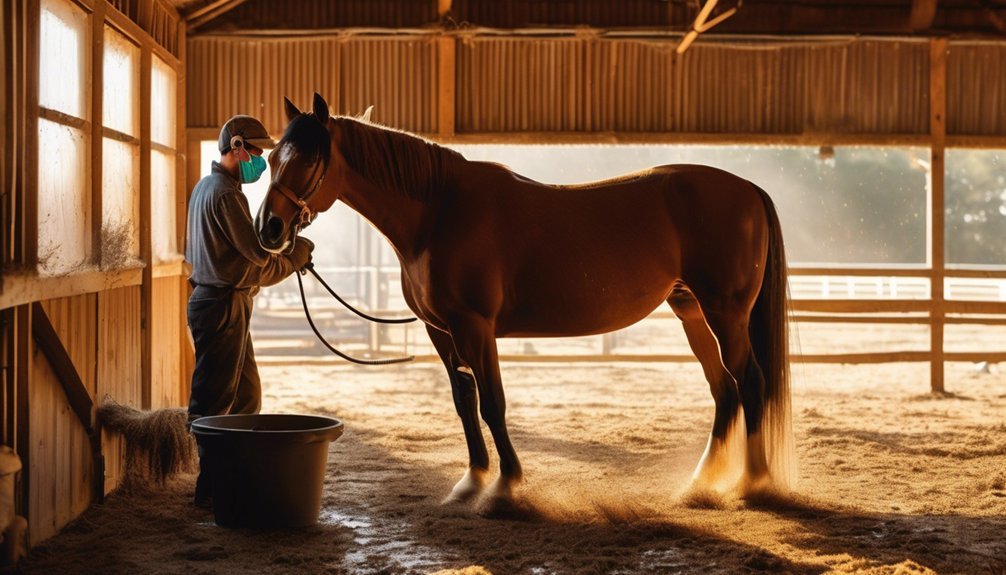
Grooming horses in dusty environments is crucial for their health and well-being, yet many overlook the specific techniques needed to combat dust. It's not just about keeping them clean; effective grooming can prevent skin irritations and respiratory issues. Understanding the right tools and methods can make all the difference in maintaining your horse's coat and overall health. Let's explore the essential strategies you need to implement for effective grooming in these challenging conditions.
Key Takeaways
- Establish a daily grooming routine of 15-30 minutes to effectively remove dust and promote horse comfort.
- Use a sturdy curry comb to loosen dirt, followed by a stiff brush to flick away particles.
- Incorporate a variety of brushes, including stiff and soft options, to address different dust levels and sensitivities.
- Regularly clean hooves with a hoof pick to prevent dust-related health issues and maintain hoof health.
- Shampoo and condition the coat with appropriate products to keep it healthy and radiant, especially in dusty conditions.
Understanding the Impact of Dust on Horse Health

Although dust may seem like a minor nuisance, it can significantly impact your horse's health. Continuous dust exposure can lead to serious respiratory issues, making it crucial to be aware of the environment your horse spends time in.
When a horse inhales dust, it can irritate their airways, leading to conditions like heaves or chronic obstructive pulmonary disease. You might notice symptoms such as coughing, nasal discharge, or labored breathing.
To protect your horse, consider implementing strategies like keeping their living area clean and well-ventilated. Additionally, using dust-reducing bedding or feeding hay in a way that minimizes airborne particles can help.
Essential Grooming Tools for Dusty Conditions
When grooming your horse in dusty conditions, having the right tools is essential for maintaining their health and comfort.
Start with a variety of grooming brushes; a stiff brush helps remove dirt and debris, while a softer brush can clear away finer dust without irritating their skin. A rubber curry comb is also invaluable for loosening dust and dirt from your horse's coat, promoting circulation.
Don't overlook your hoof pick; it's crucial for keeping your horse's hooves free from grime and ensuring their overall hoof health. Regularly cleaning their hooves prevents discomfort and potential issues.
With these essential tools, you'll not only keep your horse looking great but also contribute to their well-being in dusty environments.
Establishing a Regular Grooming Routine

Establishing a regular grooming routine is vital for your horse's health and happiness, as it not only keeps their coat clean but also strengthens the bond between you and your equine companion.
Start by creating a grooming schedule that aligns with your daily habits. Aim for at least 15-30 minutes each day, making grooming a cherished part of your routine.
Consistency is key; regular grooming helps you spot any skin issues early, keeping your horse comfortable and healthy. Incorporate a variety of grooming tools, like brushes and combs, to address different areas and ensure thorough cleanliness.
Techniques for Effective Dust Removal
To effectively remove dust from your horse's coat, start by using a sturdy curry comb, which helps loosen dirt and debris.
Employ dust dispersal techniques by working in circular motions, focusing on areas where dust accumulates, like the back and flanks.
Next, transition to a stiff-bristled brush to flick away the loosened particles. Use effective brushing methods by sweeping in the direction of hair growth, ensuring you're removing as much dust as possible.
Finish with a soft brush or cloth to give your horse's coat a polished look.
Remember to check sensitive areas like the face and legs, where gentler strokes are necessary. This thorough approach keeps your horse looking and feeling great, even in dusty environments.
Caring for the Coat: Shampooing and Conditioning

While maintaining your horse's coat, regular shampooing and conditioning play crucial roles in ensuring its health and shine.
Start with a shampoo selection tailored to your horse's specific coat type and needs, avoiding harsh chemicals that can strip natural oils. Look for gentle, moisturizing formulas that help remove dirt without drying out the skin.
When shampooing, use warm water and massage the product into the coat, taking care to reach the underbelly and legs. Rinse thoroughly to prevent residue.
For conditioning, apply a suitable conditioner, focusing on the mane and tail. Conditioning techniques, like leave-in treatments, can also enhance moisture retention and manageability.
Regularly incorporating these practices will keep your horse's coat looking radiant and well-cared-for.
Addressing Skin Irritations and Allergies
When your horse shows signs of skin irritations or allergies, addressing the issue promptly is essential to prevent discomfort and further complications.
Start by identifying potential allergens in their environment, such as dust, pollen, or certain feeds. Regularly grooming your horse can help reduce skin sensitivity by removing irritants and dead hair.
If you notice any unusual itching or redness, consider applying soothing ointments designed for equine use. Allergy prevention is key; maintaining a clean living area and using hypoallergenic products can make a significant difference.
Always consult your veterinarian if symptoms persist, as they can recommend specific treatments tailored to your horse's needs.
Maintaining Respiratory Health in Dusty Environments

Maintaining your horse's respiratory health is vital, especially in dusty environments where allergens can easily trigger issues. To safeguard against respiratory infections caused by dust exposure, implement these practices:
| Practice | Description | Frequency |
|---|---|---|
| Dust Management | Regularly clean stalls and paddocks | Daily |
| Proper Ventilation | Ensure adequate airflow in barns | Continuous |
| Use Dust-Free Bedding | Choose bedding that minimizes dust | As needed |
| Hydration | Keep your horse well-hydrated | Always |
| Monitoring | Watch for signs of respiratory issues | Daily assessments |
Frequently Asked Questions
How Can I Tell if My Horse Is Dehydrated?
To tell if your horse's dehydrated, look for dehydration symptoms like dry gums, lethargy, or sunken eyes. Use hydration tips like providing fresh water and electrolytes to keep him healthy and happy. Regular monitoring's essential.
What Should I Feed My Horse in Dusty Conditions?
You've gotta keep your horse thriving amidst that relentless dust! Prioritize dust management and ensure a nutrition balance filled with vitamins, minerals, and quality forage to support their health and energy during challenging conditions.
Can Dust Affect My Horse's Performance?
Yes, dust exposure can significantly impact your horse's performance. It may lead to respiratory issues, reduced stamina, and decreased overall health. Ensuring a clean environment is crucial for maintaining your horse's peak performance and well-being.
How Often Should I Clean My Horse's Tack?
How often do you think you should clean your horse's tack? A regular cleaning schedule is vital for optimal tack maintenance; aim for at least once a week to ensure your gear stays in top shape.
What Signs Indicate My Horse Has a Respiratory Issue?
If your horse has a persistent cough, nasal discharge, or shows signs of labored breathing, it's vital to consult a veterinarian. These coughing symptoms can indicate respiratory issues needing prompt attention to ensure your horse's health.
Conclusion
In dusty environments, if you think your horse can groom itself like a professional spa-goer, think again! Regular grooming isn't just a luxury; it's a necessity. Remember, a well-groomed horse is a happy horse—and a happy horse is less likely to become a dust-covered diva. So grab those brushes and make grooming a part of your daily routine. After all, who wouldn't want to pamper their equine friend and keep them looking fabulous while avoiding the dreaded dust cloud?





